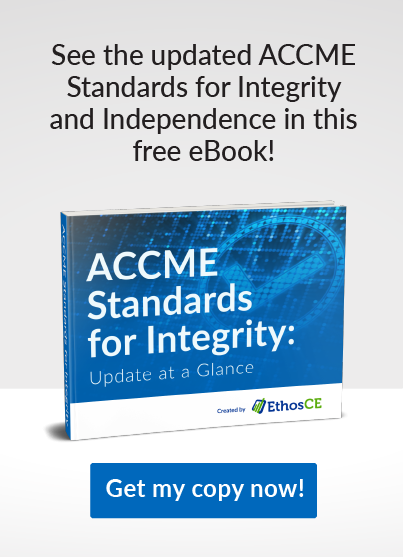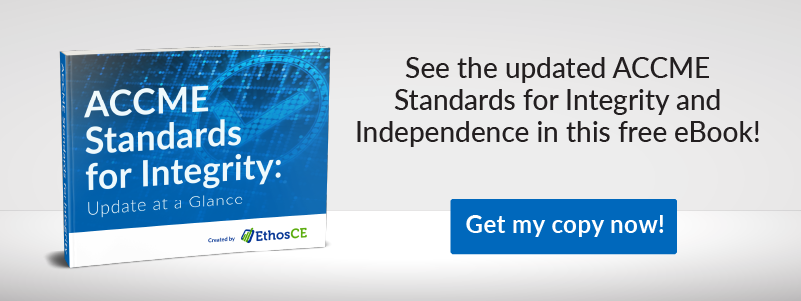Changes Affecting Industry Funding of CME Programs
Today’s CME providers face several challenges when it comes to ensuring that their continuing medical education activities remain free of industry involvement. All healthcare professionals must regularly complete CME hours. However, conflicts of interest can exist that could introduce bias into CME. This must be avoided to prevent potentially dangerous effects on patient care. In the recent changes to its five Standards, the ACCME has clear and strictly enforced guidelines that prohibit industry supporters from having any control whatsoever of the CME content being presented. These include planners, speakers, authors, and faculty. Here, we look at the changes that affect the industry funding of continuing medical education programs.
The Major Industry Funding Factors in CME
The role of industry—specifically, pharmaceutical and device manufacturing companies—in underwriting the costs of CME, while firmly accepted, is highly controversial.
According to Dr. Adriane Fugh-Berman, a professor in the Department of Pharmacology and Physiology and the Department of Family Medicine at Georgetown University Medical Center, CME is heavily funded by drug and medical device manufacturers. Since CME is considered education rather than advertising, no country regulates product promotion. Dr. Fugh-Berman reported that CME content analyses showed consistent messaging in industry-funded education. In these instances, it was observed that CME messaging favoring the advantages of sponsoring companies’ drugs—and the disadvantages of competing products— were successful.
What was the result? In one case, an industry-funded CME used messaging about its new antipsychotic drug. The prescribing frequency tripled. This increase continued for over three months when used at the Minneapolis Veteran’s Affairs Medical Center, and it was traced to a grand rounds presentation where the speaker was paid by the drug’s manufacturer.
Furthermore, an earlier study found that following an all-expenses-paid CME conference held at a tropical resort was profitable for the CME’s sponsor: that company’s drugs’ prescription rates more than doubled.
Does this show an issue with industry funding of medical education programs? While relationships between physicians and ineligible companies exist, the ACCME provides strict guidelines around how those relationships evolve. Let’s look at what you should do to avoid any potential problems surrounding your CME-accredited activities and industry funding stemming from ineligible companies.
No Bias Can Be Involved in CME
Physicians must regularly complete CME hours; it’s intended to be intellectually rigorous, evidence based, and free from bias. Any conflicts of interest can introduce bias in CME that could have potentially detrimental effects on patient care.
Joint activities between you and pharmaceutical and medical device companies and other ineligible companies can raise serious concerns because they can bypass regulatory standards if left unchecked.
The ACCME’s most recent Standards changes dictate how industry funding of continuing education should take place. Standard 5 requires that content cannot promote recommendations, treatment, or manners of practicing healthcare that are determined to have risks or dangers that outweigh the benefits or are known to be ineffective in the treatment of patients. Education is intended as an appropriate place for physicians to explore new and evolving topics but not be exposed to those who advocate or promote otherwise for financial gain.
To avoid industry funding of continuing medical education programs, review your processes for the selection of persons and organizations that will be in a position to control a CME’s content.
No Active Promotion or Sales of Products or Services
Ineligible companies are not limited to the familiar pharmaceutical and medical device companies. They include any companies that produce, market, resell, or distribute healthcare products or services that are intended for use by or on patients.
According to Standard 2, in order for you to provide content that is free from industry funding of continuing medical education programs, you must ensure that all decisions related to your planning, delivery, and evaluation of accredited education are made without any type of industry influence, including from owners and employees. No active promoting or selling of products or services can take place that would strictly serve their professional or financial interests during the course of the educational activity.
Regarding your learners, do not share their names or contact information with any ineligible industry companies or their agents. Only learners can give their explicit consent.
Identifying, Mitigating, and Disclosing Relevant Financial Information Is a Must
When it comes to the industry funding of continuing medical education programs, there are several critical processes that revolve around Standard 3. As an accredited provider, you must collect disclosure information from all planners, faculty, speakers, and others in control of educational content in the twenty-four months before the accredited CME activity, instead of the previous twelve-month time period. While many providers collect disclosures for each event as they happen, you can also do so periodically. For example, you can collect disclosures annually, biannually, or even once every ten years. The key is that the information is updated and correct when the activity takes place.
From there, mitigate any relevant financial relationships, and disclose the names of individuals having relevant financial relationships, the names of the ineligible companies where relationships exist, and the nature of the relationships to your learners. Finally, release a statement that all relevant financial relationships were mitigated.
Accepting Commercial Support
In managing industry funding of continuing medical education programs, review all your processes regarding commercial support. You must make decisions regarding the receipt and disbursement of your commercial support, with the terms documented in an agreement before the education takes place.
Standard 4 deals with commercial support. Here, record keeping is crucial. Any commercial support must be recorded and shown how it was used. It is also up to you to disclose to your learners the names of the companies that are providing the support and its nature if it was in-kind.
There are specific instances in which you can accept commercial support. It can be used to fund honoraria or travel expenses for planners, faculty, or any others who are in control of content, or to defray or eliminate the education’s costs for all learners. However, the commercial support received cannot be used to pay for the travel, lodging, honoraria, or personal expenses for individual learners or groups of learners.
Managing Your Ancillary Activities
The industry funding of continuing medical education programs plays a significant role in the marketing and promotional activities within CME, whether for live or virtual events. Based on Standard 4, you should review exactly how you can ensure that your learners can easily distinguish between accredited education and non-accredited activities, including ineligible company marketing.
Another critical area involves all activities, including the presence of non-accredited activities, whether these are virtual or in person. For each course, presentation, or other educational activity, a thirty-minute block of space must exist before and afterward.
In addition, when it comes to enduring materials in print, online, or digital formats, learners should be able to engage with the education without the imposition of product promotions or advertising.
Managing Industry Funding
The industry funding of continuing medical education programs continues to be at the forefront for CME offices. The ACCME’s Standards changes will greatly affect the way that you can give your learners the best possible CME experiences without commercial intervention.
At EthosCE, we understand the challenges of staying up to date and compliant with ACCME changes. We know how critical it is to get things done right the first time when it comes to team-based education and success.
To learn how EthosCE can enhance the continuing education of your healthcare teams, schedule a free 1-on-1 demo with one of our specialists today!
 We're now part of the Cadmium product suite! Learn more
We're now part of the Cadmium product suite! Learn more 


